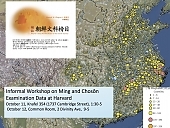Date:
Location:
Sponsored by the Harvard Asia Center, Korea Institute, Fairbank Center for Chinese Studies, and the China Biographical Database Project

Civil service examination data have been used in studies of Chinese and Korean social mobility (Kracke, Ho, Chang, Park, Choe, Wagner, Song, and Kim), political institutions and bureaucratic relationships (Araki, Zhang, Hejtmanek, Kang, and many others), fairness and equity in official recruitment (Chafee and Kim), and cultural history (Elman, Duncan, Kwak, and Kim). This project is concerned with the ways this data can contribute to our understanding of social change over time and across space through a comparative study of data from national examination rosters from the Ming period in China and Chosŏn Korea. The recent publication of Ming examination rosters by the Tianyige library at last makes it possible to create a body of structured data as good as the Chosŏn examination database created by the late Edward W. Wagner and Song June-ho.
What are the new questions this data allows us to ask, especially when combined with the other kinds of data on Korean and Chinese elites that are now becoming available? This is the best data we have for elite demography for this period by region across time short of a complete grave biography record. Topics here include changes in life expectancy and on household size. This is also the best data for intervening in the debate between proponents of the examinations as an engine of mobility and proponents of local elite self-perpetuation because we can trace kinship networks over time. The extensive kinship data (including maternal as well as affinal kinship data in the case of Chosŏn), combined with other sources, allows us to assess elite cross-generational continuity through rebellion, invasion and natural disasters. Chosŏn exam data include social status, residence, and a short list of official career while Ming exam data also include the hereditary household status, registration locality, and examination field, facilitating the study of changes in the representation of state-defined social groups, localities, and academic specialization. Finally, this data is an invaluable source of data in the study of local elite networks. The Ming data will be available through the China Biographical Database project in late September.
The workshop will introduce the Chinese and Korean data and databases, provide examples of how they can be used, and discuss research topics that might make use of them.